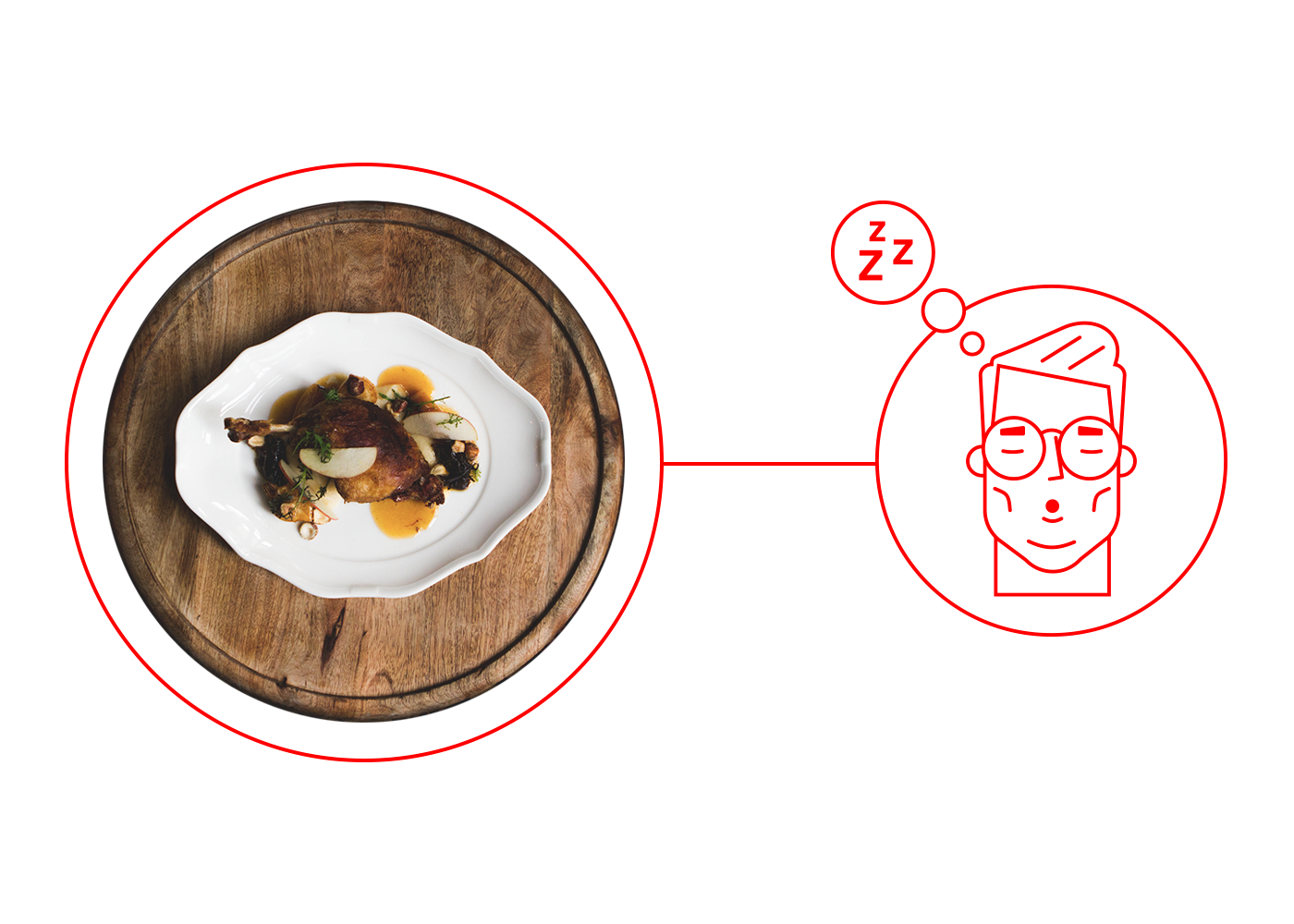Forks no longer clang against plates. Conversation lulls. Chairs scrape against the floor as family members make their way from kitchen table to Lazy-Z-Boy. The Thanksgiving feast is over. Now, eyelids drowse. Everyone starts to fall asleep, wine glasses are half full, football commentators hum in the background, crumbs stuck to mustaches flutter in the rhythm of each hot, heavy breath.
Is this your Thanksgiving meal aftermath? Maybe your astute, know-it-all cousin points out that tryptophan, present in turkey (and many other foods) is causing everyone to fall asleep by 6pm.
You can tell them that’s just a myth. Tryptophan isn’t the reason your living room looks like an kindergarten nap time, it’s all the other stuff you’re eating alongside it.
What is Tryptophan?
It’s an amino acid. Amino acids form the building blocks of protein: the main structural and functional compound in the body. While non-athletes might not have heard about amino acids, fitness buffs have probably tried to upgrade their regular protein shakes with big doses of BCAAs (branched chain amino acids) or EAAs (essential amino acids). Both these are specific amino acids found in protein that are necessary for muscle-building and great supplements for recovery.
BCAAs are non-essential amino acids, meaning they’re not essential to consume through supplementation; the body can make them itself from other amino acids in the diet. Tryptophan, on the other hand, is one of nine essential amino acids, meaning it cannot be produced by the body and must be obtained directly through food.
Tryptophan plays a part in some vital, bodily processes. It helps regulate nitrogen balance in adults and growth in infants, and also is important for production of creating niacin–essential for creating serotonin. Serotonin is a neurotransmitter associated with sleep and melatonin levels.
This is where the villainization of turkey comes in. But tryptophan isn’t just in turkey; it’s also in other high-protein foods. In fact, many foods have more tryptophan than turkey: seeds, cheese and soybeans.

You’re Tired Because
You overate.
Yes: tryptophan can make you drowsy. But the other foods that contain tryptophan in high amounts don’t get the same bad rap as turkey–so what’s causing the sleepiness?
Really it’s mixing tryptophan-rich turkey with other carbohydrates–like, say, mashed potatoes and stuffing and bread and pie–that is to blame.
Consuming carbs triggers insulin release, which causes uptake of other types of amino acid into the muscles (but not tryptophan). This means that tryptophan levels are higher than usual, especially relative to other amino acids. Normally amino acids compete with one another for uptake into the brain, but when tryptophan is present at higher-than usual amounts, more of it gets in.
Without competition, the floodgates open, allowing more and more tryptophan to enter the brain. From there it’s used to produce serotonin and eventually, melatonin.
Even if you ate a large meal without any tryptophan, you’ll likely still be tired–especially if it’s rich in carbohydrates.
Tryptophan may play a role in post-meal tiredness, but it’s largely everything else you ate putting you into a food coma.
Editors Choice

How to Get Into Ketosis Fast
The low-carb, high-fat keto diet has been shown to improve body composition and increase endurance performance. But getting into ketosis is difficu...

Ketones in Urine: All You Need to Know
Monitoring ketone levels in urine is important for both diabetics and those waiting to maintain ketosis. Here's what to look for, how to test and t...

VO2 Max: Training to Use Oxygen Efficiently
VO2 max might be the truest representation of endurance fitness there is. While elite runners and cyclists train their bodies to use a high volume ...

Do Calories Matter on a Keto Diet?
Are all calories created equal? Not on the keto diet. Weight loss has emerged as a primary incentive for going keto. That's not driven by the amoun...

Keto Diet Fundamentals
A ketogenic diet, or “keto diet,” refers to an extremely low-carbohydrate, high-fat pattern of eating. This article dives into the history of the k...

Beta-hydroxybutyrate or BHB –All You Need to Know
BHB stands for beta-hydroxybutyrate, one of the three main ketone bodies. It's a clean-burning energy source for both the body and the brain. What'...

Ketone Salts: Ketosis with a Cost
Ketone salts, also known as BHB salts, provide the body with a way to enter ketosis. But the results are mixed. There are a few options for someone...

How to Run Faster: Mental and Physical Techniques
Runners chase speed. For many, it's a lifelong pursuit. The connection between the body and the mind is important for speed, and harnessing both wi...

